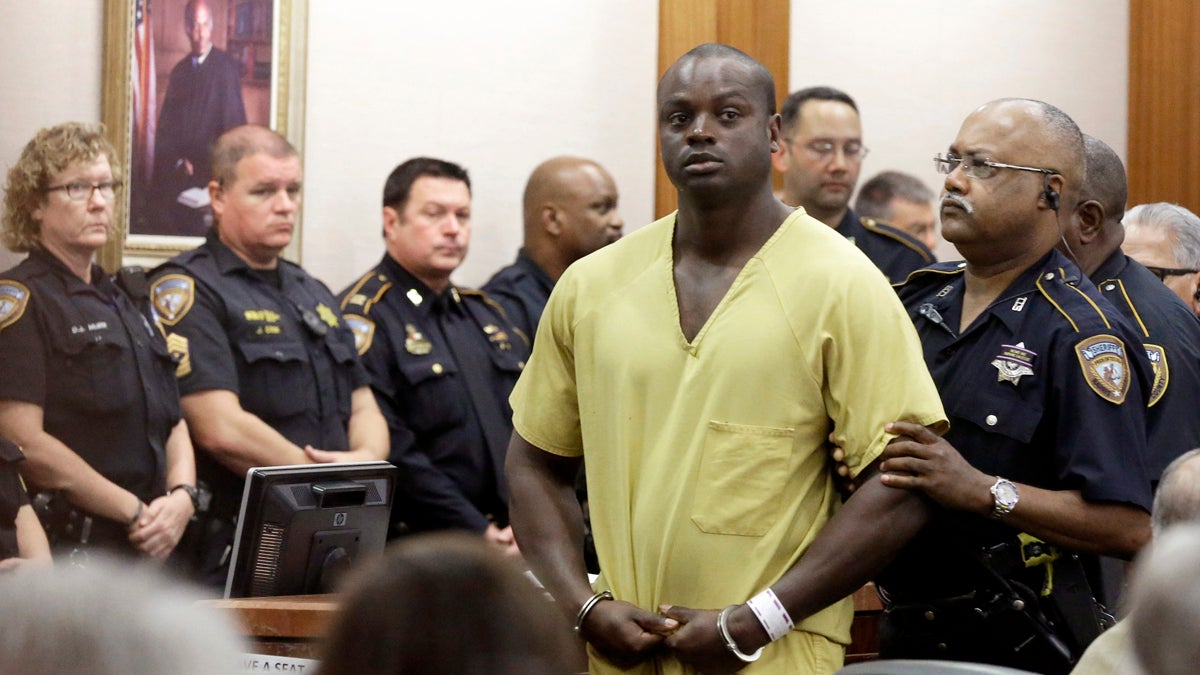Don’t blame Black Lives Matter
Listen
Shannon Miles is escorted out of a courtroom after a hearing, Monday, Aug. 31, 2015, in Houston. Miles has been charged with capital murder in the death of Harris County Sheriff's Deputy Darren Goforth. He is being held without bond. (Pat Sullivan/AP Photo)
Last Friday, Daron Goforth, a Houston-area sheriff’s deputy, was killed when Shannon Miles allegedly approached the uniformed officer from behind and pumped 15 bullets into his body while the officer was pumping gas.
I am appalled by the crime, and I anxiously await the conclusion of a thorough investigation.
If, as the video evidence seems to show, Miles took this officer’s life, Miles should face justice through our legal system.
I have seen the speculation that Miles has a history of mental illness. In the absence of an investigation, however, I don’t know anything more about the crime. Neither does Harris County, Texas, Sheriff Ron Hickman. But that did not stop Hickman from blaming Miles’ actions on the “rhetoric” generated by Black Lives Matter, a movement that seeks to stop the deaths of unarmed African Americans at the hands of police.
“This rhetoric has gotten out of control,” Hickman said at a press conference shortly after Goforth’s death. “We’ve heard ‘black lives matter,’ ‘All Lives Matter.’ Well, cops’ lives matter, too. So why don’t we just drop the qualifier, and just say ‘Lives matter,’ and take that to the bank?”
Hickman was right about one thing. Everyone’s life matters, whether they are a civilian or a police officer, whether they are black or white, whether they are rich or poor.
But in my view, just about everything else about Hickman’s statement was wrong.
As a law enforcement professional, Hickman should know that it is irresponsible to assign blame before an investigation has been completed. He should know that, from a legal standpoint, even the actions of alleged shooter Shannon Miles, which were apparently caught on video, remain unproven until he is found guilty in a court of law.
But there is an even more troubling undertone to Hickman’s assertions, because Deputy Goforth was white, and his alleged shooter is black. As much as we’d like to believe that doesn’t matter, the truth is it does.
It matters because the so-called rhetoric of the Black Lives Matter movement centers on the fact that blacks are far more likely to be killed by police than whites. It matters because the police-related deaths of unarmed black civilians like Eric Garner, John Crawford, Tamir Rice, and others, were caught on video, yet no police officer was convicted. It matters because no one should have to launch a movement to remind law enforcement that every life is important, no matter the color of one’s skin.
Is the Black Lives Matter movement responsible for the tragic shooting death of Deputy Goforth? Of course it isn’t. If indeed he carried out this shooting, Miles is responsible for his own actions.
But apparently, in the minds of people like Sheriff Hickman, when one black person does something, we are all somehow to blame. Perhaps even more troubling, Hickman and others seem to believe that it is incumbent upon black people to remain silent when police unjustly beat, shoot, or otherwise harm us. If we dare to speak up about such treatment, then we are deemed responsible for whatever negative actions occur afterward.
In any other instance, this would be called blaming the victim, but when it comes to African Americans, there seems to be a different set of rules.
It’s wrong that the very police officers whose salaries we pay can kill us with impunity. It’s wrong that officers who kill unarmed civilians do not face public trials, but instead face secret grand jury proceedings that rarely produce indictments. It’s wrong that we are too often left to mourn lost loved ones while the officers who kill them are free to return to their jobs, to their families, and to their lives.
Are there times when police officers should discharge their weapons? Of course there are. But when their lives are not in danger, and they kill unarmed civilians, police officers should face the same type of scrutiny that anyone would.
Shannon Miles, the man who allegedly pumped 15 bullets into Deputy Daron Goforth, should also face public scrutiny. If, after the investigation and trial, Miles is found guilty of murder, he should be prosecuted to the fullest extent of the law.
That’s what Americans should expect in every case, whether the perpetrator is black or white, rich or poor, officer or civilian.
Justice, after all, should be blind.
Listen to Solomon Jones M-F from 7 to 10 a.m. on 900 am WURD.
WHYY is your source for fact-based, in-depth journalism and information. As a nonprofit organization, we rely on financial support from readers like you. Please give today.


